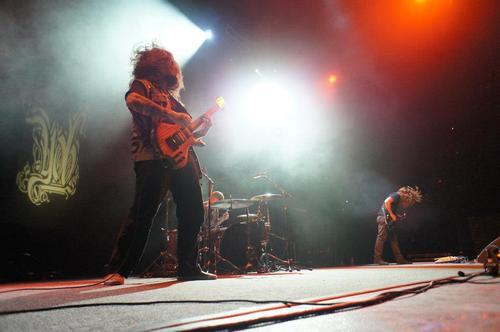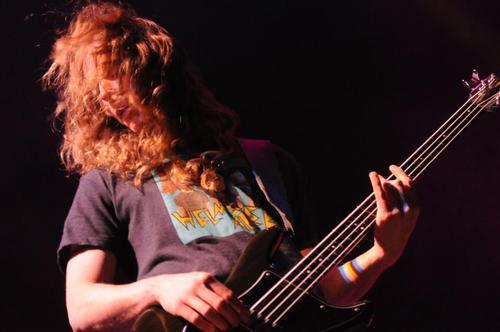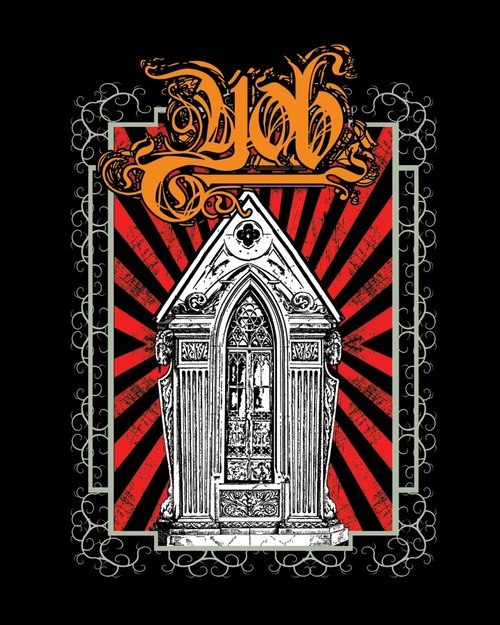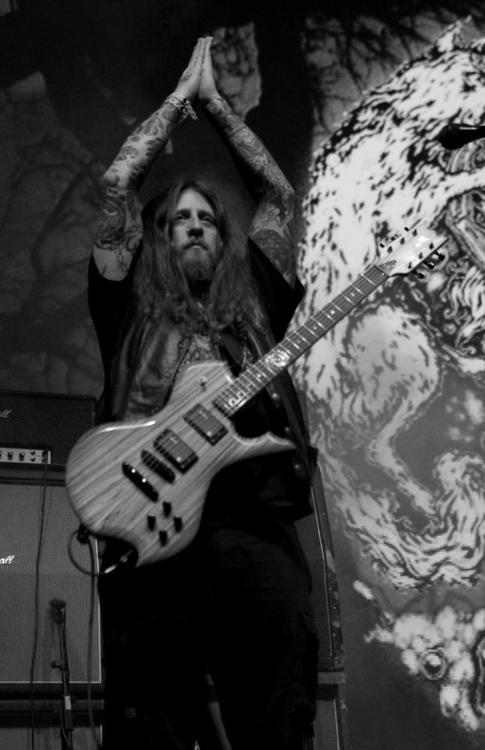It was pouring rain, and I was coming down with pneumonia. I knew this as I made the trek from Birmingham to Little Rock, and all I could think of was what the hell I was about to witness. St. Vitus, YOB, Weedeater, Rwake, and Norska all in one night. After parking and hauling my ass through the downpour, I found myself standing in the entrance to the Rev Room. It was about an hour before show time, and I saw two men having a conversation right outside the doorway leading to the show space. One was obviously the guy who ran the venue, and the other was a guy with long hair, a beard, a Norska shirt, a pair of shorts, some Chucks, and round glasses. It was the glasses. I knew it was Mike Scheidt, and despite having never met the man before, I immediately felt a kinship with him. This was confirmed as I extended my hand to introduce my (nervous) self, and Mike refused, choosing instead to embrace me and welcome me to the show.
From that point forward, I witnessed one of the, if I may use the word, coolest moments in all the shows I’ve ever attended. Mike Scheidt is a fan first and a musician second. Perhaps one of the main reasons for YOB’s incredible influence in the metal and music world is due largely to the fact that its vocalist is on a plane of understanding that humanity would do well to emulate. Mike and I had a continuing conversation throughout the evening, and at the end of the night as I made the trip back to Birmingham all feverish and coughing my ass off, I couldn’t help but think that while I’d witnessed the unparalleled sonic pummeling of a YOB show, I’d, more importantly, seen the concept of what I considered a “rock star” thankfully fade into oblivion. I had the opportunity to chat with Mike about a great deal of things – just a few of which are here.
Mike, my first question for you is what’s brought you to this point, man? From your earliest childhood memories to now, how have you see yourself evolve as a musician?
Well, I think my evolution is funny because when I was a kid playing, I was playing metal songs, but I was hanging out with punk rock bands. I mean, what made me want to do it was actually this band called Dirtclodfight. They’ve been around for a long time, and when I was a kid, like fourteen years old, Dirtclodfight hadn’t formed yet, but the brothers, Phil and Fred Merwin, and my buddy Eric Dorman and Austin used to jam, and they’d be doing Dr. Know covers and new Trouble covers and Black Flag, and it just really had a big impact on me to the point where I wanted to start playing guitar.
Eric Dorman and the others were doing Celtic Frost covers, and he taught me a lot of what I know about playing the guitar, so that’s when I started playing and my influences back then were like early Metallica and Slayer and Onslaught and Oz, like old band Oz, and definitely Corrosion of Conformity. Metal and punk is where I’ve always kind of been and you fast forward to 2012, and it hasn’t changed much, you know. I’m not sure I’ll ever grow up, but I do think that my evolution changed a lot when I started doing a little Travis picking. I did that working really high in a guitar shop for about ten years, and the guys that work there, that’s all they did, so that’s what I learned. It’s like, “Well, alright, well I have to learn how to play for real.”
Well, your solo stuff is very different. I mean you don’t hear the metal, necessarily. You hear a lot of folk. I mean there’s a certain blend to the sound that speaks to your obviously varied influences.
I mean, I was born in 1970, so I was crawling around listening to the folk explosion that is still very much alive on the radio. Then you had all the early stuff that was considered “pop”, which is everything from Steely Dan to Doobie Brothers to Zeppelin to the Beatles to Hendrix and Janis Joplin and, Gordon Lightfoot, and Cat Stevens, so that’s what I grew up on.
When I think of acoustic music, I don’t think of it from a metal perspective. I think of it from an acoustic perspective and so, in doing my solo record, it was tempting to do YOB unplugged, but that felt like the easy way out. When I say that I mean, it’s still six songs in 42 minutes, so I’m not sure if I’m totally fooling myself in thinking that it’s drastically different, but in my mind it is. Getting a lot more into King Crimson and Rush had an effect on the music and then each era of metal and punk has then further refined where I come from. Like seeing Will Haven blew my mind and changed the way I played forever. Seeing Immolation blew my mind and changed the way I played forever. I started playing different chords and more discordantly upon getting really into them, and then there was Sleep and Electric Wizard and all of that, so I really come from a lot of different places, but it’s not that out of character from where I’ve always been.
Right. It kind of varies and changes as we grow, but essentially comes from the same place. Take New Order, for instance. I hear so much of their influence, especially today, in so many bands that are considered metal.
I’ve always been a New Order fan. Joy Division I couldn’t appreciate until much later on.

It seems like in the last five or six years, there’s been a resurgence of respect or critical acclaim for metal, Mike. You’ve got so much exposure now for incredible bands. What’s the deal?
Well, you know, it’s fascinating. I think in the 80s and maybe even in the early 90s as far as like bigger publications go, there’s artists in music and metal – they’re musicians, but it’s kind of like it’s entertainment; kind of the way like going to see Friday the 13th is entertainment. That’s not art. It’s Friday the 13th, and I think that definition is maybe expanded some, but I also think, too, that metal and all of its offshoots existed without that support and thrived without it. I mean, band after band after band, album after album after album: punk bands, hardcore bands, metal bands; they existed in this underground world and played all this music that they had no choice but to play.
It wasn’t cool at all, and it’s kind of cliché to say, “Oh, it wasn’t cool but we were doing it,” but you got your ass kicked. It wasn’t cool, and then especially in the 80s there was all the metal hardcore friction. It wasn’t cool in metal if you were punk, and it wasn’t cool with the punk kids if you liked metal, so there was this friction. Going to see Motorhead and Cro-Mags in 1986 was a really tenuous meeting of people because Motorhead brought everybody, and so it was skinheads and punks and metal guys and bikers and it was just fights all night. I’m like 14 years old in the back of the room in a Saxon shirt just praying I don’t get destroyed, but it’s changed a lot, and now it just…metal shows have a refined audience a lot of the time. I’m not bagging on them, but I’m not talking about like the Disturbed crowd or something like that which is, I don’t know, maybe I’m a dick saying it, but it does seem like a meathead kind of crowd a lot of the time, but if you go see Sunn, it’s a very sophisticated crowd.
It’s people from all walks, and so I think these journalists have started to see that and are like, “Wait a minute, you know, this never needed us, and it’s growing and growing and it’s progressive.” I don’t know how many other styles of music are really truly progressive, because even when I listen to so called progressive rock, I think, “Well, where are you progressing it? Did this not exist in 1973?” Maybe it did, maybe it didn’t. Is it really progressive now, or are you a progressive rock band the way a punk rock band is a punk rock band, and you’re not really… it’s just a genre now. It’s not progression. I do think that in metal there are bands that exist today that did not exist in 2002. There were bands in 2002 that existed, that were creating metal that did not exist in 1992. There’s always the emulation bands, you know, whether it be thrash metal or whatever, and I have no problem with that at all. If their hearts are totally in it, and it makes me feel their sincerity, then I kind of don’t care what they’re doing.
I just think people are just kind of recapitulating what’s been there all along, but it seems like more bands in the metal genre are focusing more on the art itself and not so much the image.
Well, I think what’s happening as metal has become more wide stream, there’s been more of a widespread acceptance of it. I do see danger, and it’s starting to kind of be a parody of itself a little bit where I’m looking at band photos, or going through a magazine and it looks like it’s an advertisement for a movie. You know, it’s so over the top, and I just come from an area that you just really had to have the substance. You really had to have the substance, and the image was part of it, but I mean, how many bands have we heard that have goats and skulls on the cover and then you spin it and it’s like it’s not quite there yet. It’s half cooked, or I’m not going to say it sucks, but it’s just the heart isn’t there.
It’s image heavy, substance light, so I think that there is some danger with that, but I think it’s just the nature of something getting bigger. More people want to get involved, but they maybe haven’t found their personal connection to it yet, or they haven’t found themselves in it and how it’s not about trying to sound like or look like, it’s what am I moved to write.

As far as when you approach things from a lyrical standpoint, what are the main influences? What’s the catalyst for you?
Oh, man. Yeah, my influences come from Eastern Mysticism, Ramana Maharshi, Sri Nisargadatta, HWL Poonja, Shunryu Suzuki, Zen tradition, Chogyam Trungpa – I also love Bukowski. For me to write the lyrics I want to write – it’s basically like if you go to the nonfiction section of audio books – that’s kind of where I come from I guess. I have nothing against people that write fantastical lyrics or whatever the lyrics are. I just want to be a righteous aware human being, and so that’s what I want to write about, and that’s what I feel good writing about, and that’s where I feel like I can connect with other people, because I can reach out with my lyrics and find like minded folks, and then on stage, when we play, we get to share that. We get to share that together. Their experience is my experience; it’s their experience, it’s my experience; but I don’t like to write it from the point of view of being aware or being awake.
I’d rather write it from the true sense which is schlepping towards it or stumbling towards it. Fall down, get back up. Falling down – there’s nothing wrong with it. It’s better for falling down and getting back up. It’s from a human imperfection and hopefully unpretentious standpoint. The best scenario is when if we can be really awake and present on stage and then we can have a group of people with us that are feeling that or bringing that and then bringing that to us, then we’re bringing that to them and they bring that to us, and then it becomes this environment that becomes much like sacred space. It becomes more than musicians on stage and people in a crowd; and so that’s what’s the most exciting thing to me. I don’t see us as entertainers. We’re just up there digging deep and it’s a path and it’s a method.
Mike, when you’re not with Yob, when you’re not doing solo stuff, when you’re just chilling out by yourself just in your own personal space, how do you find your zen, how do you find your center?
You know I go through phases of different things. I go through phases of where I listen to a lot of music. I’ll go through phases where I don’t listen to any music. Nothing. I like movies, for sure. When I’m home, I don’t go out a lot. I mean, I’ll go out and see shows. I definitely watch sports, but I also feel like I have to balance all my activity with non-activity. I have three kids. I have 17-year-old twins and a 13-year-old and uh, yeah. (laughs)
They’re not with me full time, but they come to my house a lot, so it’s really important to me to have a really stable environment for them and for me to be stable myself and the only way I can do that is to balance out all this crazy activity with some centered non-activity; but then also being in activity trying to stay centered. With shit going on it’s crazy and with tours, shit goes wrong every other day, and you just have to try to always be “path of the hero, path of the warrior, path of the hero.” It nobody’s fault in the moment. You just have to work through it.
I definitely try to stay in shape for a 42-year-old dude and work out and run. I taught self defense for a lot of years – Krav Maga from Israel. I taught that for eight years and since YOB has been touring a lot more, I haven’t been doing it because I’m out of shape, and I’m in a van all the time and then when I get home, that system is truly a survival system, and I just feel like I need to be in shape. I also read quite a bit.

What’s the last great book you read?
I’m in the middle of Blood Meridian right now.
Oh wow.
I’m solid halfway through that book, and I’ve been reading it in pieces, because I really want to get it and it’s really heavy. So, I’ve been reading that. The thing that’s weird is I could be reading like five or six books at a time. I go back and forth between them. I also love retarded books, you know, I mean not that they’re retarded, but you know, Brian Keene or Edward Lee. It’s very over the top writing, but…
It’s popcorn.
Yeah, pretty much, but I enjoy it and some are better than others for sure. I’ve definitely been reading some Lovecraft too. I just have so many that I read.
It’s just interesting, Mike, to hear the incredible and vast influences you have from all spectrums of life when it comes to what you obviously put into your music. For me, hearing something like that serves to basically eradicate the beat the mindset that people who listen to metal are all minions of Satan, or that we all wear black hoods and burn upside down crosses into our foreheads. We don’t have lightbulbs, we have candles and goatskulls adorning our deep, dank places of residence.
I’m sure there’s a lot of people who will disagree with me on this, but I personally feel a certain kind of hope in that there’s more of a bigger culture of people that are willing to embrace some darkness. Because not embracing it, and I’m not saying taking part in like creating some kind of horrible situations for people. I’m just talking about embracing what it is in us that makes those things happen in the first place because it is human nature. There’s been a lot of well documented evil done in the name of good, and some people would argue that Anton Lavey actually was a pretty positive dude. He just didn’t take any shit. He wasn’t going to have something force fed down his throat. He was just like, “Look, I stand for myself.”
Well, it’s the whole Westernized cultivating of religion dynamic.
That’s right. The Catholics who drink the blood of Christ every day, eating his body – it’s all figurative and all that, and I think just right and wrong, if those lines are getting blurred some or these people are asking questions about what are basically ideologies that are in most cases very young ideologies; we’re talking hundreds of years or thousands of years. That’s seems like a long time, but it’s not in the grand scheme of human civilization.
So they just come and go and what’s constant, you know, let’s pay attention to that. What do we have in common? Let’s pay attention to that. I guess that’s what makes me maybe potentially a hippie is because I just don’t see where blood shed ever really solves it. It’s just an ideology, but I guess another ideology and from both perspectives, from where they were born and where they were brought up – it’s right. And worse, you can really see how the collective consciousness is affected.
It’s not just in a jar. It’s not just in a war theater. It’s the entire world and all creatures and beings. Everything is affected. Everything. The plant life is affected. The earth is blown up in bits, and it’s an entire environment. It’s not just a human environment. It’s not just an animal world or a plant world or a matter environment. It’s all of us.
photo credits to: Al Jones and Rynne Stump
Many thanks to Mike and the rest of the YOB crew for their time and for an absolutely stunning show. The mantra of that evening was “Fuckin’ YOB,” and I’m inclined to agree. Here’s to great metal and a greater sense of who we are.
Cheers. – D


